Tattoos need serious thought and consideration. Showing up randomly outside a tattoo shop and demanding a tattoo be done ASAP is not the way to go. You don’t want to piss off the person who will be sticking needles in your skin, right? So, before you get inked, read all about proper tattoo etiquette – and the do’s and don’ts of getting tattooed.
Page Contents
- DO think before you ink
- DO schedule an appointment
- DO have a design concept ready
- DO observe proper hygiene
- DO tell your artist about any existing medical conditions
- DO let your tattooist work in peace
- DON’T get a tattoo if you’ve drunk alcohol or under the influence of drugs
- DON’T be upset if the artist tries to improve your design
- DON’T get a tattoo if you’re ill or taking antibiotics
- DON’T be afraid to ask your tattooist for more info about the process
- DON’T bring your entire friend group to the shop
- DON’T try to pass yourself off as an adult
- Final Thoughts on Tattoo Etiquette
DO think before you ink
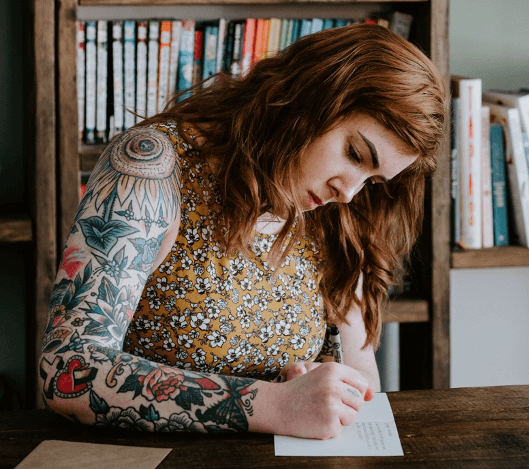
Tattoos are permanent. Are you sure you want that ink on your skin forever? It won’t always look as good. In a few months or years, it’s going to start fading. How will you feel about it then?
Here’s what you can do to help ensure your decision is the right one:
- Weigh the pros and cons of getting a tattoo. How will it affect your life? Will it make you happy? Will it have any effect at work, i.e. how will your employers react to your tattoo?
- Sit on your decision for a month or two – or a year! It’s a momentous decision that will have an effect on the rest of your life. You will see it everyday. Can you live with that knowledge – and that sight?
A spur of the moment tattoo usually leads to regret. This is why there’s a rising number of people getting their tattoos removed. And you know what’s really not great about tattoo removal? It’s far more expensive and more painful than getting a tattoo in the first place!
DO schedule an appointment
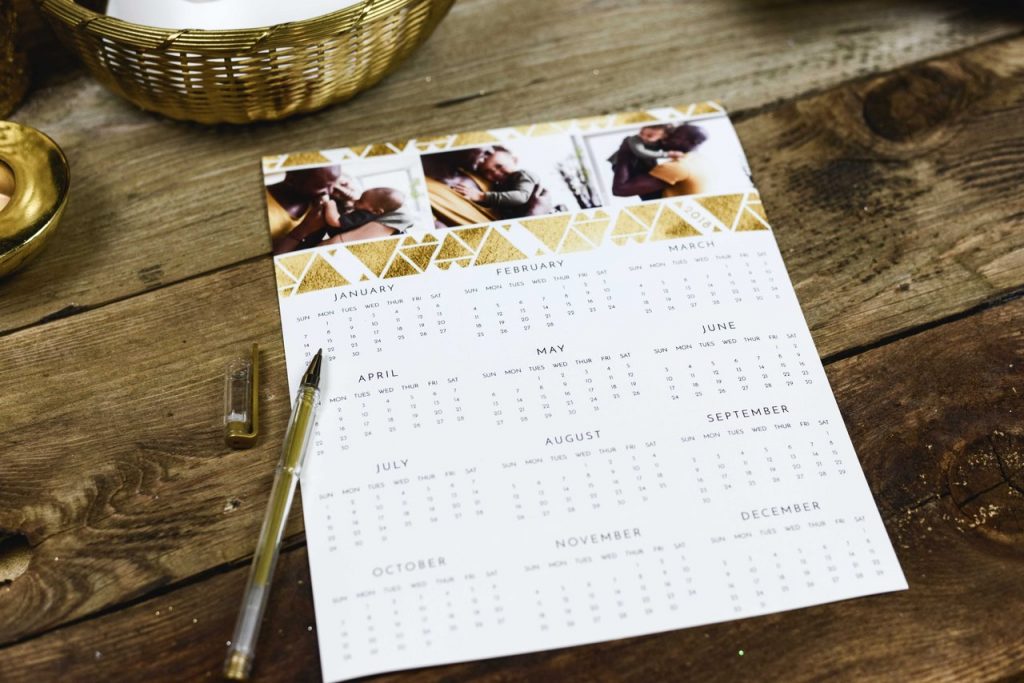
There are some tattooists who accept same day walk-ins. But for really talented artists, they’ll be booked months in advance. This is especially true for artists whose work is displayed on celebrity skin. These celebs go on social media to show off their new ink, gives a shout out to the artist, and voila! The artist’s schedule is suddenly booked solid for the foreseeable future!
Now, of course, not everyone’s so fortunate to have a full calendar. But still, it’s good practice to schedule an appointment before heading to the parlour. This gives the tattooist ample time to prepare for the inking session ahead.
DO have a design concept ready
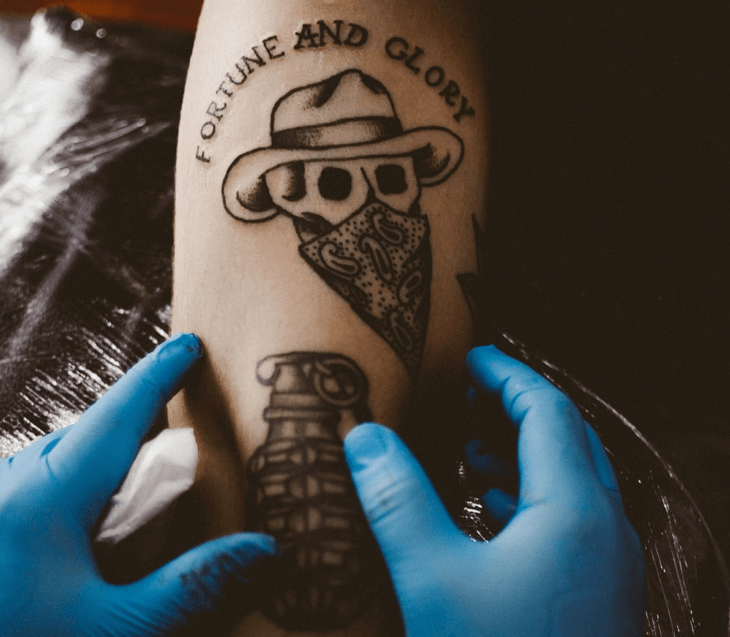
People get tattoos for a variety of reasons. Some do it for sentimental reasons. Others do it because they want to immortalise something, and they want a constant reminder of that special person/place/event/etc. Still, others do it for the experience. No special reason, they just want to have a beautiful work of art on their skin.
Many tattoo artists are actually artists. So, don’t be afraid to share your design concept and ask for their input – they’d absolutely love that. Tattooists usually focus on a particular style and you can ask to see their interpretation of your concept.
If you don’t have a design in mind, you can try asking if they have pre-designed artworks available. Many tattooists also proudly display their best work in their shop or in their social media accounts. Tell them if you like a specific design, maybe they can help you create a more personalised design – something that will look good on you and be uniquely yours.
DO observe proper hygiene
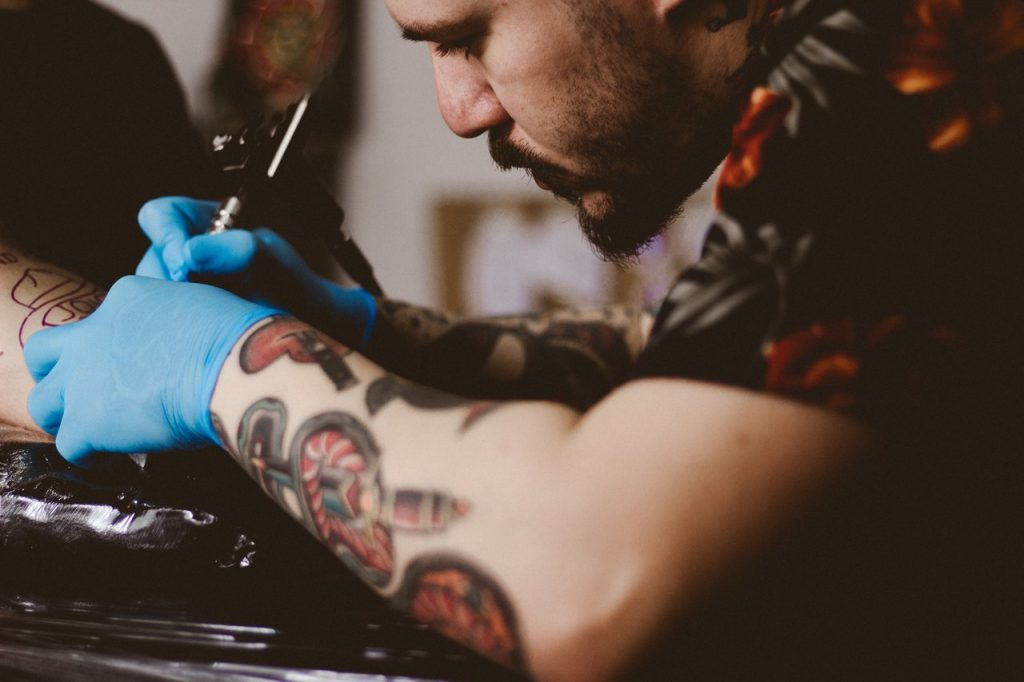
Your tattooist will be working on your skin. You don’t want to disrespect them by showing up dirty and downright smelly. They’ll literally have their nostrils just a few centimetres above your skin – they need to do this to ensure they’re hitting the right spots.
Yes, the tattooist will be cleaning up the area they’ll be working on. And you don’t need to worry about shaving the area in advance, they can do that at the parlour. But it doesn’t mean they’ll willingly breathe through their mouths the entire time just to avoid smelling you!
You don’t want your artist to pass out in the middle of your session. So, please do observe proper tattoo etiquette by cleaning yourself up on the day of your appointment.
DO tell your artist about any existing medical conditions
A licensed tattooist will ask you if you have any existing medical conditions. Most likely, they’ll have a form ready for you to fill out. Don’t think you’re doing yourself a favour by hiding the truth from them.
What your tattooist will do on your skin is technically a minor medical procedure. He will puncture your skin with a tattoo machine, so that ink can be inserted in the dermis. While the wound isn’t going to be all that deep (the dermis is just a few millimetres below the skin’s surface), a million things can still go wrong with the procedure.
For instance, you may have a reaction to the ink or to the pressure being applied on your skin. If you have severe psoriasis or eczema, a tattoo may not be for you. If you’re prone to keloids, you may develop multiple keloids from the tattooing process. You may also not be physically capable of withstanding the pain.
DO let your tattooist work in peace
If you know what’s good for you, you will let your tattooist alone. Sure, it’s fine for a bit of chitchat to break the ice and maybe put yourself at ease. But for the most part, let the artist work in peace.
He or she needs to concentrate and focus on the task at hand. They need to make sure they’re hitting the right depth, and they’re not stretching or pulling at the skin too much because these can lead to tattoo blowouts.
Another reason why you need to let your artist focus is so that they can follow the design. Whether they’re freestyling or following a tattoo stencil, it’s important to get the job done right. You do want to get your money’s worth.
DON’T get a tattoo if you’ve drunk alcohol or under the influence of drugs

Alcohol and tattoos don’t mix. You’ll may have heard of tales of drunken folks getting tattooed with or without their knowledge. The truth is that alcohol will thin your blood. And when it comes to tattooing, blood clotting is an important part of the healing process.
When blood thins, the clotting response is much slower which means there’s more bleeding than normal. This has a two-fold effect:
(1) It can cause visibility issues for your tattooist, making it hard for them to see what they’re doing, and
(2) The blood may also thin the ink.
It’s best to avoid drinking alcohol 2 days before getting tattooed and at least 3 days post tattoo to allow your skin to heal.
DON’T be upset if the artist tries to improve your design
There are many different tattoo styles. Your tattooist may not be comfortable working with the style you like, and may want to have it converted over to his style. Don’t be offended if he suggests an alternative design. Accept the suggestion, have the artist draw out his interpretation, and decide if you want to go with his version or not.
If you really want your particular design done, perhaps you can ask him to refer you to an artist who knows your style and can give your design justice. Just don’t be rude if he can’t give you what you want.
DON’T get a tattoo if you’re ill or taking antibiotics
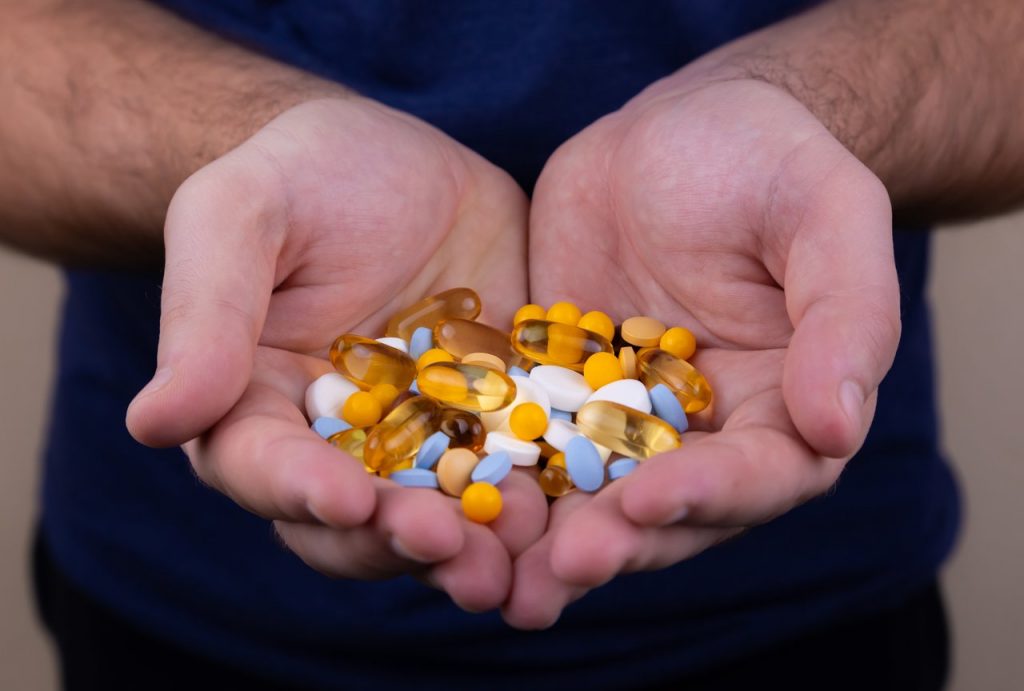
When you’re sick, your health is compromised. Technically, you can still get inked even if you’re sick or taking antibiotics, but it’s not a good idea. Why? Because you’re going to overwork your immune system. It’s trying to put out too many fires at the same time. This essentially means your tattoo may not heal at an optimal rate. Instead, the opposite may happen and the tattoo healing process may be affected.
DON’T be afraid to ask your tattooist for more info about the process
You’re not going against the rules of tattoo etiquette if you make some enquiries. It’s your skin, after all. And you’re paying good money to have some ink inserted in it. You may have done research on the artist, but you shouldn’t forget about what’s going to be inserted in you.
Did you know not all tattoo inks are created equal? A number of them actually contain heavy metals like mercury, lead, chromium, cobalt, and more. Make sure you know what’s going in your skin. Otherwise, you risk a tattoo ink allergy, or worse, tattoo ink poisoning.
Also, ask about aftercare – what you need to do to ensure your tattoo heals properly. There are many things you need to do and each tattooist may have their own aftercare instructions. To give you an idea of what aftercare is all about, here’s an infographic:
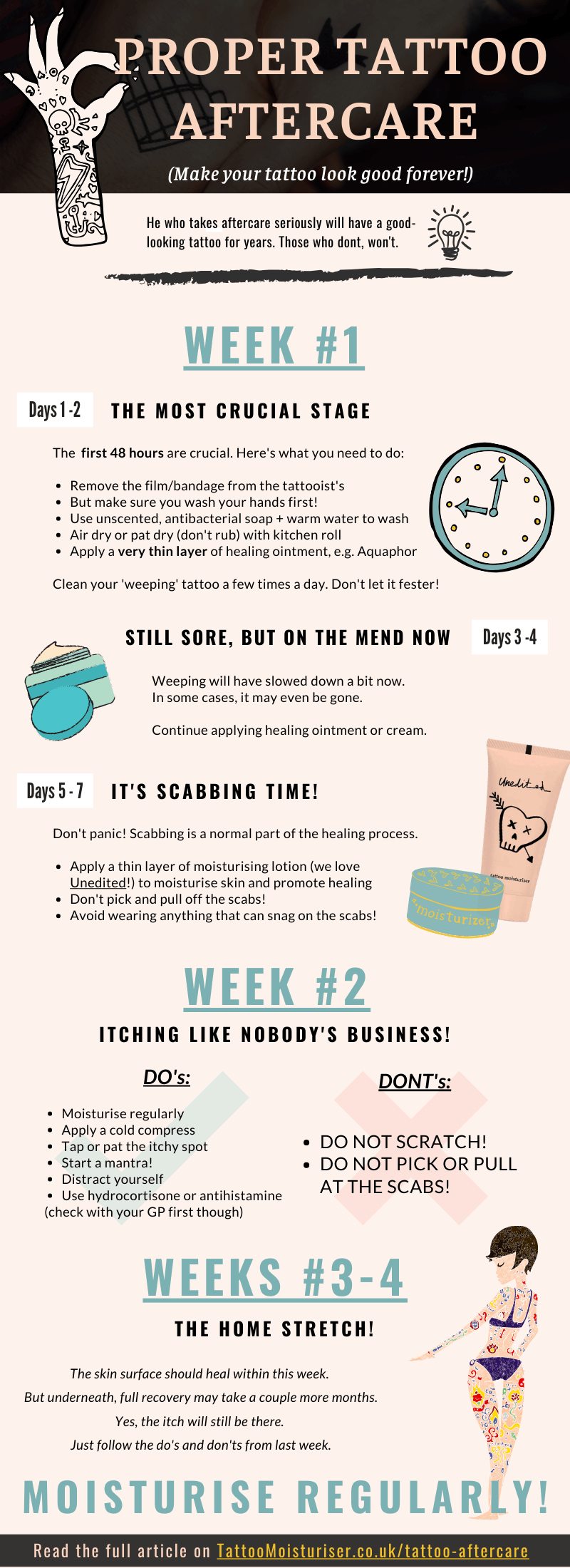
DON’T bring your entire friend group to the shop
A friend is fine, but make sure you ask the tattooist first if it’s okay to have someone watch the entire session. Some artists aren’t comfortable when there are too many eyes looking over whilst working. They need plenty of space to do their thing, so let them have it.
DON’T try to pass yourself off as an adult
In the UK, you need to be at least 18 years old before you can get a tattoo. Even if you get parental approval, if you’re under 18, no licensed tattooist will work on you. Otherwise, they risk losing their licence.
For other countries, you need to look up the laws in your city or state. For instance, in the United States, some states allow under-18s to get a tattoo as long they get written parental consent.
Final Thoughts on Tattoo Etiquette
Tattoo etiquette is just as important as your choice of tattooist. Observe the do’s and don’ts listed in this article, and you’ll have a much better chance of getting the tattoo experience you’ve always wanted to have!
